- Clone
- QA17A51 (See other available formats)
- Regulatory Status
- RUO
- Other Names
- CD67, CGM6, NCA-95, CEACAM8
- Isotype
- Mouse IgG1, κ
- Ave. Rating
- Submit a Review
- Product Citations
- publications
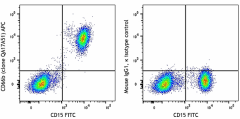
-

Human peripheral blood was stained with CD15 FITC and CD66b (clone QA17A51) APC (left) or Mouse IgG1, κ APC isotype control (right).
| Cat # | Size | Price | Save |
|---|---|---|---|
| 396905 | 25 tests | ¥27,500 | |
| 396906 | 100 tests | ¥69,080 |
CD66b is a 95-100 kD glycosylphosphatidylinositol (GPI)-linked protein also known as CD67, CGM6, and NCA-95. CD66b is a member of the immunoglobulin superfamily, carcinoembryonic antigen (CEA)-like subfamily. CD66b, expressed on granulocytes, has been reported to induce activation in neutrophils and to be involved in heterophilic adhesion with CD66c.
Product DetailsProduct Details
- Verified Reactivity
- Human
- Antibody Type
- Recombinant
- Host Species
- Mouse
- Formulation
- Phosphate-buffered solution, pH 7.2, containing 0.09% sodium azide and BSA (origin USA)
- Preparation
- The antibody was purified by affinity chromatography and conjugated with APC under optimal conditions.
- Concentration
- Lot-specific (to obtain lot-specific concentration and expiration, please enter the lot number in our Certificate of Analysis online tool.)
- Storage & Handling
- The antibody solution should be stored undiluted between 2°C and 8°C, and protected from prolonged exposure to light. Do not freeze.
- Application
-
FC - Quality tested
- Recommended Usage
-
Each lot of this antibody is quality control tested by immunofluorescent staining with flow cytometric analysis. For flow cytometric staining, the suggested use of this reagent is 5 µL per million cells in 100 µL staining volume or 5 µL per 100 µL of whole blood.
- Excitation Laser
-
Red Laser (633 nm)
- Product Citations
-
- RRID
-
AB_2820052 (BioLegend Cat. No. 396905)
AB_2820052 (BioLegend Cat. No. 396906)
Antigen Details
- Distribution
-
Granulocytes/neutrophils
- Function
- Cell adhesion, neutrophil activation
- Ligand/Receptor
- CD66b
- Cell Type
- Granulocytes
- Biology Area
- Immunology
- Molecular Family
- Adhesion Molecules, CD Molecules
- Antigen References
-
- Kuijpers T, et al. 1993. J. Immunol. 151:4934
- Kuroki M, et al. 1992. J. Leuk. Biol. 52:551
- Gene ID
- 1088 View all products for this Gene ID
- UniProt
- View information about CD66b on UniProt.org
Other Formats
View All CD66b Reagents Request Custom Conjugation| Description | Clone | Applications |
|---|---|---|
| PE anti-human CD66b Recombinant Antibody | QA17A51 | FC |
| Purified anti-human CD66b Recombinant Antibody | QA17A51 | FC,IHC-P |
| APC/Fire™ 750 anti-human CD66b Recombinant Antibody | QA17A51 | FC |
| PE/Dazzle™ 594 anti-human CD66b Recombinant Antibody | QA17A51 | FC |
| PerCP/Cyanine5.5 anti-human CD66b Recombinant Antibody | QA17A51 | FC |
| PE/Cyanine7 anti-human CD66b Recombinant Antibody | QA17A51 | FC |
| APC anti-human CD66b Recombinant Antibody | QA17A51 | FC |
| FITC anti-human CD66b Recombinant Antibody | QA17A51 | FC |
Customers Also Purchased
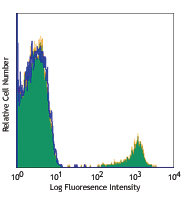
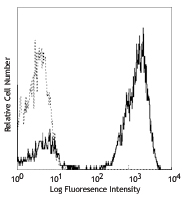
Compare Data Across All Formats
This data display is provided for general comparisons between formats.
Your actual data may vary due to variations in samples, target cells, instruments and their settings, staining conditions, and other factors.
If you need assistance with selecting the best format contact our expert technical support team.
-
PE anti-human CD66b Recombinant Antibody

Human peripheral blood was stained with CD15 APC and CD66b (... -
Purified anti-human CD66b Recombinant Antibody
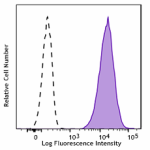
Human peripheral blood granulocytes were stained with CD66b ... 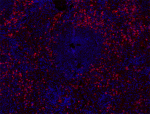
Human paraffin-embedded spleen tissue slices were prepared w... -
APC/Fire™ 750 anti-human CD66b Recombinant Antibody

Human peripheral blood was stained with True-Stain Monocyte ... -
PE/Dazzle™ 594 anti-human CD66b Recombinant Antibody

Human peripheral blood was stained with True-Stain Monocyte ... -
PerCP/Cyanine5.5 anti-human CD66b Recombinant Antibody

Human peripheral blood was stained with True-Stain Monocyte ... -
PE/Cyanine7 anti-human CD66b Recombinant Antibody

Human peripheral blood was stained with True-Stain Monocyte ... -
APC anti-human CD66b Recombinant Antibody

Human peripheral blood was stained with CD15 FITC and CD66b ... -
FITC anti-human CD66b Recombinant Antibody
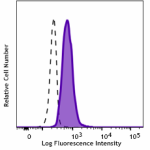
Human peripheral blood granulocytes were stained with anti-h...










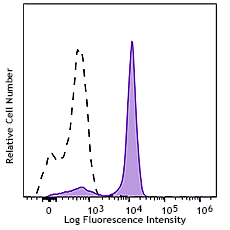
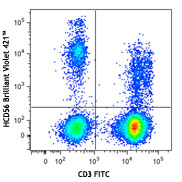



Follow Us